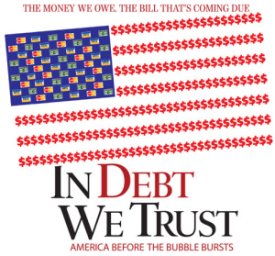
When I was growing up, I remember my father used to keep a credit card hidden in the back of his closet.Á‚ It was one of those “In case of emergency” things that he rarely used.Á‚ If he did use it, he paid it off at the end of the month.Á‚ So, I had it embedded in my mind that if I ever got a credit card, that I had, had, had to pay it off at the end of the month if I ever made a charge.Á‚ And for the most part, that’s what I did.
I was surprised when I got a my first credit card.Á‚ It was a department store card that came in the mail weeks after I filled out an application at a table in the quad during my first year of college. I had a part-time job that paid minimum wage, and I put down what I earned at the job figuring I’d never get approved for credit.Á‚ After all, I didn’t make much money, so why would a credit card company take the risk?Á‚ Ha!Á‚ Macy’s looked at the “financial me” that was on the paper application, and stamped out a card with my name on it. A few days after it arrived, I went to the mall and bought some socks and a shirt, and felt some unease when I presented my card.Á‚ “Will they accept this from such a fresh-faced kid?” I thought.Á‚ Yes they did.Á‚ And then I did something naive:Á‚ I ran upstairs and paid my credit card bill because I thought it was the responsible thing to do. The woman at the credit department had a good laugh when I pulled cash out of my wallet to pay for the credit charge I just made.
She just worked there as an hourly employee, but I’m sure somewhere in the thicket of the billing department, some salaried analyst cringed.Á‚ Why?Á‚ Well, my behavior marked me as a deadbeat.
Yes, financial responsibility equals “deadbeat” in the world of credit. And until the financial meltdown, credit card companies were on the hunt for “revolvers” whose financial behavior was that of an addict who couldn’t stop spending and needed a little something “extra” to help them get what they needed. Maybe you were one of the, um, lucky ones who would get weekly credit card solicitations tempting you with 0% APR for six months.Á‚ Did you ever wonder how they made money on those 0% cards?Á‚ Well, it took time to loosen the laws controlling things like interest rates, late fees, and other fees that could be tacked on whenever a credit card company felt like it (as long as they notified you within 15 days). But after 20 years, credit card companies were able to get what they wanted:Á‚ a complex contract between the company and the individual that structured the terms with little to no government oversight and no real recourse if you felt like you were getting a fist rammed up your anus. In 20 short years, we’ve gone from a form of debt that was used sporadically by many people (and was hard to get), to an economy largely built on debt spending.
As middle class wages stagnated (spurred in large part to the globalization of labor in manufacturing), the cost of living increased, and the gap between wages and expenditures grew, the 0% APR card became the way in which people could bridge that gap and still feel like they were living the American Dream.Á‚ But of course, it all came at a price, and now that we’re in a financial pinch, credit card companies are doing things that, while within their contractual rights, are basically souring the milk individuals have been sucking on for over a decade.
What are they doing to sour the milk? Well, these companies are using the same “financial behavior profiling” they used to identify “revolvers” (their prized customers), but are now assessing their overall risk of default in a different way.Á‚ If the risk is too high (and no one except the credit card companies make that determination), they cut the credit limits of revolvers to roughly the amount they have outstanding in debt.Á‚ So, let’s say you’re a revolver and have $30,000 in debt — but you thought your limit was $40,000 — well, the company now says that your new limit is amount of your debt. Now let’s say you make a $10,000 payment so you can have a $10,000 cushion in case you need it.Á‚ Well, the company could reset your limit to your new balance so that your $30,000 limit becomes $20,000. The more you pay down your debt, the more they can decrease your limit.Á‚ It is a way companies control the risk of default, but you see what’s happening here, don’t you?Á‚ The contraction of credit means the velocity of money will slow and so will the economy — and this is on the individual level.Á‚ At the institutional level, you have to follow indicators like the Libor rate and the TED spread, but a similar thing is happening.Á‚ Credit is contracting, governments are shoveling money into the system to loosen the flow of money and reduce the severity of the recession. Money is being put in, but, it’s not trickling down in the form of loans to individuals.Á‚ Instead, banks like JPMorgan Chase are using taxpayer money to buy up the competition and get tax breaks to boot.Á‚ Huh, what?
So for all the money we as taxpayers are loaning to these financial wizards, what are we getting in return? It seems it boils down to this: financial austerity for individuals, and financial rewards for the companies who created the scheme that lead to the crisis we’re in.Á‚ Pretty much the same deal we’ve been getting for over 20 years.




Comments